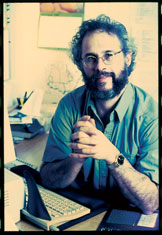|
|
Keepers of the Flame |
March 2000 |
|
Recently, I interviewed a job candidate who is a folk musician. When I asked whether she had ever studied music, she replied that studying music might "ruin" her as a folkie. This, of course, is not a new idea. Many people fear that once they learn advanced harmony, they won't be content to play less complex music. It's sort of like saying, "Learning to read ruins you for honest labor."
Although I take issue with her conclusions, our fearful folkie is not entirely off base. Music students (and even professionals) often fall into the elitist trap of thinking that the complex music learned in formal study (for example, classical and jazz) is inherently better or more challenging than harmonically simple folk music.
But it doesn't have to be that way if you continue to respect the music and understand that different genres call for distinct musical approaches. Learning jazz does not negate your ability to play traditional, three-chord Delta blues. And playing even the simplest music at an extremely high level is challenging. If you don't think so, try taking on B. B. King in a blues cutting contest.
I hope that as we mature as musicians, we come to understand that the goal is to make good music-music that successfully communicates beauty and emotion (or their opposites), and perhaps tells a story. Technique and theory are merely useful tools. Traditional music can be every bit as powerful and valid as any other type of music. If we remember that, we can educate ourselves and still play the old tunes in the old-fashioned way. In other words, we can play appropriately for each musical situation.
Of course, you don't need a formal education to become a superior musician. But if you really want to grow as a musician, formal music training is a great way to go. You have nothing to lose but your ignorance.
Unfortunately, American music instructors are woefully underpaid and underappreciated. These teachers and their programs need our active support and assistance. MENC: The National Association for Music Education draws attention to this worthy cause through its annual Music in Our Schools Month, which is observed throughout March. For more information on this campaign, visit MENC's Web site, www.menc.org.
There is much more we can do to help. Give your children the opportunity to learn music. Donate time and money to a music school. Mentor a less-accomplished musician, or at least take the time to patiently answer questions. Lobby your local and national politicians to support music-education programs.
Ensuring educational opportunities for our fellow musicians is an inherently good thing; it also serves our enlightened self-interest. Remember that we in the music industry are the keepers of the flame of musical knowledge, and we all bask in its warmth. Please do your part to keep the flame burning brightly. |
